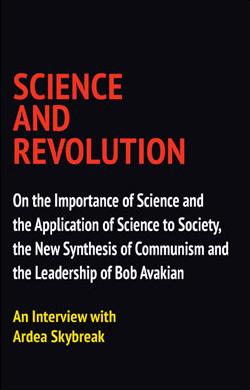Question: The statement “On the Strategy for Revolution” from the Revolutionary Communist Party, which people can and definitely should read at the website revcom.us–that strategy statement talks about the orientation of right now working to bring forward, orient and train thousands of people in a revolutionary way, with those thousands reaching and influencing millions of people even before a revolutionary situation, and then in a revolutionary situation, leading those millions of people. It seems like part of what you’ve been saying is that getting into BA is a really essential element of that process of bringing forward, orienting and training thousands of people in a revolutionary way who are reaching and influencing millions now and then in a position to lead those millions in a different situation, a revolutionary situation.
AS: Yes, absolutely. You can’t have a revolution without revolutionary theory, without scientific methods that can clarify what is correct versus incorrect revolutionary theory, and what is the direction things should go in, or should not go in. You don’t have a chance of having a successful revolution if you don’t take up these kinds of methods. And BA models these kinds of methods all the time. All people need to do is pay attention, listen and read and discuss.
Question: I want to return to what we were talking about a little while ago, in terms of what it means that Bob Avakian has brought forward a new synthesis of communism, and I wanted to ask you about the basic difference it would make for, not just a few people, but waves of people, to take up this new synthesis of communism that BA has brought forward, the difference that would make in the world right now.
AS: Well, look, the new synthesis of communism, it’s either correct or not to call it a new synthesis, and people are welcome to grapple with this and to dig into it, and should do that in order to recognize that it actually is a new synthesis. But what that means is that there’s a whole leap, a qualitative leap, in our human understanding of the stage of history that we’re in, and what is the material basis underlying the contradictions, the problems that exist in the world today, including in this society, but everywhere else as well, and what can be done about it. There has been what people refer to as “the end of a stage of communism,” the end of the first wave of the socialist revolutions, and there’s an opening now for the beginning of a new stage. But unfortunately today, there are very few genuine communist revolutionaries anywhere in the world, at least at this point. Very few. So it’s not like the new synthesis of communism brought out by Bob Avakian is the fashionable method or the fashionable ideology that zillions of people around the world are taking up at this point. Quite the contrary. People are fighting against it. People are trying to turn away from it, mainly by ignoring it, neglecting it, refusing to dig into it with any kind of depth and substance, which we’ll get into some more in a minute, I’m sure
But it’s an outrage that people refuse to engage this. When somebody has done this much work and spent their whole life developing this framework, you should first of all do some deep study of the framework instead of just superficially dismissing it. If you dig into the new synthesis deeply and then still end up having some serious differences with it that you can actually flesh out and argue about with substance–well, OK, then, let’s go ahead, let’s have those discussions, let’s have that kind of serious engagement. But most people, even some people who consider themselves revolutionaries or communists, they’ll just kind of lightly dismiss it, without any serious engagement and without even knowing what it’s about. They haven’t done the work. They haven’t read the articles and the books. They haven’t listened to the talks and watched the movies. But they still feel entitled to just reject and dismiss it, telling anyone who will listen that it’s no good. To me that is unconscionable. Because what is right and what is wrong in these matters will ultimately have bearing on the lives of millions and billions of people. So it matters, and deserves to be seriously engaged and evaluated.
Or, in the very few instances where people have actually tried to do a critique of the new synthesis, they have typically grossly distorted it, revealing that they do not really understand it, particularly in terms of method, and the application of that method to a number of critical questions. Once again, people should go to the online theoretical journal Demarcations, which can be accessed through the website revcom.us, where you can find substantial polemics that thoroughly examine and refute these critiques of the new synthesis and discuss what the new synthesis actually is, and why it is so crucial.
Then there are people who say they are anti-communist, simply because they’re full of prejudices and misconceptions. Because somebody at some point in their lives told them, “Oh everybody knows communism failed, people hate socialism, capitalism is the best possible system.” You “just know this” why? You just know this because somebody somewhere told you that “everybody knows that!” and you bought into this, on blind faith! The only reason you supposedly “know” that communism is no good is because the authorities, the ruling authorities, have been promoting that kind of anti-communist propaganda for a very long time. But face it: You don’t even really know what you’re talking about. You’ll just repeat the slanders about China and Mao, for instance, but have you seriously looked into it to see if it’s really true? Do you even know what kind of contradictions, what kinds of big social problems, they were trying to resolve? What kinds of social needs they were trying to meet? Do you even know what great accomplishments they actually managed to bring about, to the benefit of the vast majority of people, and in just a few short decades? Do you know what their starting point was, the problems they were dealing with when they seized power, and do you know what the old society was like in China, under feudalism and colonial domination, what the old ways of doing things were that were so brutal and oppressive and that they were working so hard to dismantle and get away from? Be honest: You don’t really know any of that, do you? Not really, or in any case not with enough depth. Because if you did, you probably wouldn’t make such facile dismissals of the struggles that they waged. If you actually studied all this deeply and with an open mind, you would know more about, and you would be talking more about, the phenomenal transformations that they were able to accomplish in that society under socialism, in the days of Mao’s leadership. Once again, you can start learning about this by going to the thisiscommunism.org website, which you can link to through the revcom.us website, and checking out some of the substantial work that Raymond Lotta has done on this, and reading some of the analyses that Bob Avakian has done about the restoration of capitalism in post-Mao China, the nature of Chinese society before the revolution, what Mao and the revolutionary party in China were trying to accomplish, and did accomplish, that was extremely positive, and what difficult contradictions they were grappling with, including within the party.
You know, a lot of these people who just give you the one or two sentence dismissal about how “everybody know that this was a disaster, or everybody knows Mao killed millions of people, or everybody knows....” You don’t know shit, OK, to be perfectly blunt about it. You don’t know shit, because you haven’t done the work. And especially those of you out there who are supposedly intellectuals, academics, knowledgeable people, educated people, and scientific people–give me a break! Because you wouldn’t be able to hold forth for ten minutes about what they actually did accomplish, about what they were trying to accomplish, about what problems they were running into, about how they tried to resolve them, about the complexity of the contradictions they were wrestling with, about the many instances in which they handled things the right way, the instances where they made mistakes...you can’t really talk about any of this with any depth or substance because you haven’t really bothered to look into this seriously, so you basically don’t know shit. And yet you somehow feel completely free to repeat and spread a bunch of canned propaganda slanders that supposedly “everybody knows...” and that you have just swallowed whole, uncritically and on blind faith. Shame on you! This makes me mad. Don’t tell me that it’s acceptable to just dismiss a whole huge human social experiment, one that concretely accomplished many wonderful things, and that secondarily had some shortcomings and problems. Don’t tell me it’s OK to just arrogantly wave your hand and dismiss it without having even really looked into it seriously and with an open mind. That’s just so socially irresponsible. That is so unconscionable. That is, frankly, disgusting.
And again with very, very few exceptions, in the international movements, or in this country, people won’t even discuss and dig into BA’s new synthesis. They’ll just make snarky comments and remarks like, “Oh BA, everybody knows...that’s some kind of a cult. Everybody just blindly follows him around, or they think he’s the greatest thing since sliced bread, or whatever.” Once again, this is totally socially irresponsible. Somebody has spent decades of their life working on the problems of society, working on the problems of revolution, working on the problems of how to actually fight in a way that you could win, but also fight for a goal that is worth winning, and in a way that is consistent with that goal, so you don’t end up with something worse or just as bad as where you started off. Someone who has grappled with great depth and richness with all these issues, and has actually brought forward actual evidence, people–concrete evidence, OK?–repeated patterns of evidence. So you know, bring me the proof. Bring me the evidence. If you claim this stuff isn’t right, bring me the proof of why it’s not right. Do the work. Bring the evidence. Because BA does bring the evidence. He does approach things scientifically. He doesn’t say things because he just “feels” like saying them and because this comes from just some kind of personal “belief.” He doesn’t go on belief, he doesn’t base himself on any kind of “belief”–instead he bases what he says and argues for on concrete and demonstrable scientific evidence. So how ‘bout you try to do the same thing for a change?
On the positive side, it would make a big difference if more and more people became actively committed to learning about the new synthesis–to honestly, with principle and integrity, dig into some of its key principles and key methods and approaches, and, on that basis, critically evaluate it. And then promoted even more widespread discussion about all this in society more broadly. You don’t have to agree with everything, you don’t even have to know everything about the new synthesis to recognize that broader society-wide wrangling with the new synthesis could have great social value. Again, if somebody has spent 40 years developing a new synthesis, I obviously wouldn’t expect somebody just encountering it to start “representing” for the new synthesis, or to be able to do a full criticism of it, or whatever, after just a few months. But even someone who has only recently been exposed to this work in a beginning way should be able to recognize that there’s something very substantial and very serious here that at least deserves serious engagement, and societal debate. Whatever people end up thinking about it, people should be engaging and discussing it seriously, studying it. Undergraduate college students should be writing papers, graduate students should be doing Ph.D. theses, on this new synthesis of communism. Regardless of where you ultimately fall out on it, BA’s body of work is substantial, it is deep and profound, and it demands to be taken seriously, and to be analyzed seriously and to be debated and discussed very widely throughout society.
For individual orders: at Revolution Books NYC, Revolution Books Berkeley, and Insight Press
Available in print and e-book at your favorite online retailer
For "Buy 2 at a discount with second one sent to a prisoner" and bulk orders: Contact Insight Press, info@insight-press.com or (773) 329-1699. Payment accepted via credit card or money order. Or write Insight Press, 4044 N. Lincoln Ave., #264, Chicago, IL 60618
Booksellers and Book Clubs: Contact Independent Publishers Group (IPG), Baker & Taylor, Ingram and other wholesalers.
Pre-publication PDF of this major work available here.
Read excerpts from THE NEW COMMUNISM here.
So even if you had just that going on, it could make a big difference in a positive sense. My understanding is that a big objective of the BA Everywhere campaign, for instance, is to broadly promote precisely that kind of broad societal engagement and debate about this new synthesis. The goal is obviously not to try to get a bunch of people to be blind followers of BA–“blind followers” could not contribute to advancing this project, this conception of revolution. It requires conscious engagement. OK? So the idea is not to get a bunch of blind followers but to promote widespread engagement with the new synthesis broadly throughout society, to get as many people as possible to become familiar with BA’s new synthesis of communism, to discuss it and debate it, study it and wrangle with it, and bring in their own insights, and bat things around with others who are doing the same thing, all as part of a process. And those people who become convinced that this new synthesis really is on track, really is where it’s at, in terms of analyzing the source of the problems of society and analyzing what the solution should be–those people who become more and more convinced of all that should become active fighters for the new synthesis, spreading it to every corner of this society, as well as around the world, taking it out to all sorts of people, to the people in the neighborhoods of the inner cities, into the prisons, into the halls of academia, into the scientific institutions, to people in the arts and other cultural spheres...in short, everywhere!
The only people who...sometimes it’s frustrating because sometimes you get the sense that the rulers, some of the ruling class figures, are the ones who pay the most attention to these theoretical breakthroughs in revolutionary strategy and vision and conception and method. Of course that’s because they’re trying to defend their system against this! On the other hand, sometimes the people who need this the most, who suffer the most, or who have the most criticisms of this system and the way things are, who may complain on a daily basis about this problem or that problem, sometimes they can’t be bothered to actually do the work to learn about this whole vision and conception that’s been worked out over 40 years and more, and that is actually claiming to have a way out. Now, if you end up deciding that no, you don’t like it, this is not the way out, fine, then make your case for that, and go do your own thing. But meanwhile, don’t say that you’re part of struggling against the problems in society and all these different outrages, but at the same time make a point of refusing to seriously check out what BA’s been arguing for. That would be like refusing to take advice from a doctor who has decades of experience and expertise dealing with a medical problem–why wouldn’t you want to hear what that doctor’s got to say?!
Question: Yeah, I definitely want, in a moment, to come back to this point about the snark and slander, and the haters, and the dismissal without engagement. But first I wanted to go a little bit more at this point about how the new synthesis is a theoretical framework to initiate a whole new stage of communist revolution, but at the same time it’s facing a very sharp battle up against other outlooks and methods, and other understandings of the problem and solution. So I wondered if you could talk a little bit more about that: the new synthesis up against other understandings of the world, of problem and solution.
COMMUNISM: THE BEGINNING OF A NEW STAGE
A Manifesto from the Revolutionary Communist Party, USA
Available in English, Farsi, German, Portuguese, Spanish and Turkish from RCP Publications, P.O. Box 3486, Merchandise Mart, Chicago, IL 60654
$5 + $1 shipping. A draft translation into Arabic is now available online. See all translations here.
AS: Well, I don’t know that I can do justice to this in this interview, and I’m going to point people to more things that they could read on the website. People should go to the revcom.us website where they can find many of BA’s works, and summaries of what the new synthesis is about. Also, people, including on the international level, who are interested in digging into this and understanding things on a more global plane, should definitely check out Communism: The Beginning of a New Stage, A Manifesto from the Revolutionary Communist Party, USA, and the whole section that is there about the new synthesis. And I have to say, once again, that people really need to get into the polemics in support of the new synthesis–such as the polemics from the OCR [The Revolutionary Communist Organization] in Mexico and others who are defending the new synthesis and promoting it in opposition to a lot of different wrong lines in the international communist movement. These polemics are actually very rich in lessons and analyses, they are a valuable resource for people to turn to. And the journal of theoretical struggle, Demarcations, which can also be linked to through the revcom.us website, is a very important resource which is promoting broad engagement and struggle internationally over key questions, including analyses of things like what happened in Nepal, how and why the revolution in Nepal went off track, and other related questions.
I’ve spoken a little bit earlier about some of the epistemological errors that have plagued the international communist movement. Two basic types of errors. First, there is a kind of brittle dogmatic tendency among some organizations and parties–you can’t talk to them about things further evolving in the science of communism, almost as if there were never any new objective developments and never anything new to be learned. They approach communism as if it were a bunch of sacred tenets, or like a catechism, rather than a living science. In fact, they refuse to approach it as a science, and to recognize that there’s a need for a science itself to evolve, for new things, new understandings to be incorporated, as part of the accumulating knowledge needed to advance things. They act like they are frozen in time, and they do a lot of damage because of that. And then there’s the other tendency which is also very prevalent, and very damaging in the world, and that represents the opposite error. There are some organizations and parties that are trying to evaluate things like why the socialist revolutions got turned back, why capitalism got restored, first in the Soviet Union and later in China, but who don’t go about digging into this in a rigorous and systematic scientific manner. So they go very much off track, and they think they’ve made some great new discoveries, found a great new alternative, when all they are really doing is arguing for nothing more than standard bourgeois democracy. They tend to think that the basic problem is that everything has to become essentially more elastic, or that the problem in the old communist parties was just too much bureaucracy, and they just don’t recognize or correctly dig into the actual epistemological and ideological errors, the basic errors of method and approach, that were involved in a lot of these situations–they don’t sort it out correctly.
And if you want to see, by negative example, what happens when you don’t apply the kind of rigorous scientific, consistently scientific methodology that Bob Avakian applies, then look at some of these parties and organizations that have gone off track in recent times, because they’ve based themselves only on very partial and unsystematic experience and understanding, and tried, frankly, to rely also on pandering to different social strata. They’ve undone some of their own best work and rendered worthless some of the sacrifices of their own people, because they haven’t been consistent, and they’ve allowed themselves to be buffeted about by one pull or another, usually of bourgeois democracy, of those kinds of illusions. Sometimes you think that really what they want is the kind of bourgeois revolution of 1776 in the United States or 1789 in France. In the bourgeois revolution, when the bourgeois class came to power, it did bring in some bourgeois democracy and some liberties and some emphasis on individual rights that had not existed in prior feudal societies. But you get the feeling that some of these revolutionaries in today’s international communist movement can hardly see beyond that kind of early bourgeois framework! They’re also not keeping up with the big objective changes that have gone on in the world and in the class configurations in the different countries. And they’re also frankly not proceeding from a very inspiring vision of how society should be organized, or how the struggle for a new society should be conceived of and undertaken as part of the larger international struggle, the international communist struggle to emancipate all of humanity.
That’s the thing. You want to see where people go off track? Time and time again, you’ll see that people are not proceeding back from the goal of emancipating all of humanity. They fall into the trap of promoting and trying to advance just one little corner of the struggle–in one particular country, or addressing just one particular set of needs. They’re not proceeding from the most inspiring global vision of all this. And this leads them to go off track. There are many different ways people can go off track. Again, things like the theoretical journal, Demarcations, and the polemics in support of the new synthesis, and the Manifesto of the Revolutionary Communist Party that speaks to the end of a stage and the beginning of a new stage in the communist movement–these are all good places to start digging into these important questions. These are not easy things to get into if you’re brand new to things, but they are things that people should be struggling around. And I think you should be able to pretty quickly see that, if there were more systematic engagement and deep discussion, not just of revolutionary practice in a tactical sense, but of these deeper strategic questions, in relation to those deeper strategic goals, such as what is argued for in the new synthesis, taking into account the way the world has actually been changing, and taking into account the breakthrough advances in philosophy and epistemological method that BA has been representing and concentrating, then I think there would be a much richer mix and much richer basis on a world scale for people to connect in a more unified way, in terms of a revolutionary direction, going in the direction of a communist world.



